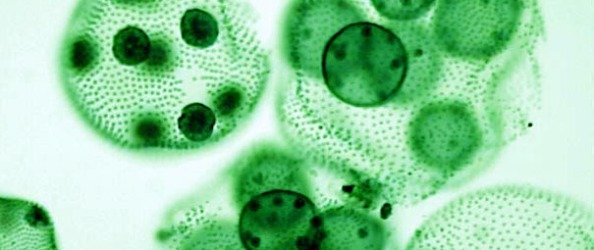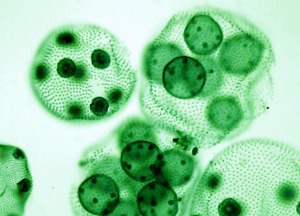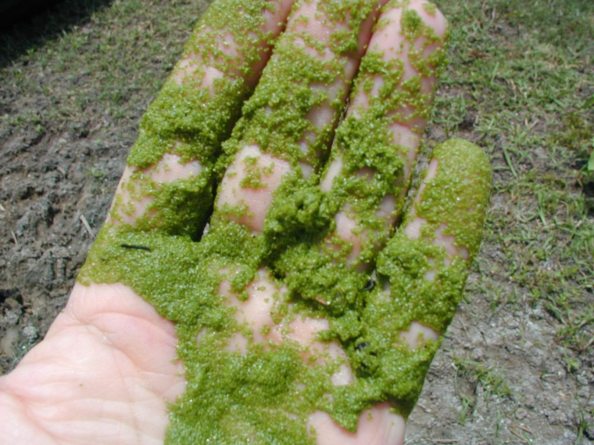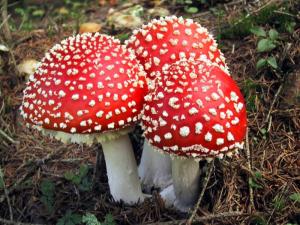
I HAVEN’T BEEN ATTENDING to this blog for some time, and I thought a restarter is best done not in a heavy manner.
I have noticed that many people are mispronouncing two words (and their related forms) with increasing regularity — even on scientific or nature TV programmes.
The pronunciation guidelines apply to all varieties of English.
__________
alga, algae, algal
Alga (singular noun) is pronounced al-guh (IPA /ˈælgə/) with a hard ‘g’ sound.
Algae (plural noun) is al-jee (/ˈældʒi/) with a soft ‘g’ (or ‘j’) sound.
Algal (adjective) is al-guhl (/ˈælgəl/) with a hard ‘g’ sound.
PRONUNCIATION MISTAKES
- Mispronouncing alga with a ‘j’ sound as al-jah.
- Mispronouncing algae with a hard ‘g’ sound as al-gahy (‘al-gay’).
- Mispronouncing algal with a ‘j’ sound as al-juhl.
WORD ORIGINS
The English singular noun alga dates from 1550s. It comes from the Latin word alga (meaning ‘seaweed’) whose ultimate origin is unknown, probably from a proto-Indo-European base meaning ‘to putrefy’ or ‘to rot.’
(Proto-Indo-European is the unattested prehistoric parent language of the Indo-European family of languages.)
The English plural noun algae is neo-Latin of around 1794, when it was primarily used in scientific literature. Algae has since entered into mainstream language.
WHAT ARE THEY?
 Algae are unicellular or multicellular aquatic eukaryotic organisms* that contain chlorophyll and other pigments. These green, red or brown organisms occur in fresh water or saltwater habitats or moist ground. They range from microscopic single-celled forms to spreading, multicellular forms of 100 feet (30 metres) or more long.
Algae are unicellular or multicellular aquatic eukaryotic organisms* that contain chlorophyll and other pigments. These green, red or brown organisms occur in fresh water or saltwater habitats or moist ground. They range from microscopic single-celled forms to spreading, multicellular forms of 100 feet (30 metres) or more long.
Algae were previously classified as plants because of their containing chlorophyll. Like plants, algae manufacture their own food through photosynthesis and release large amounts of oxygen into the atmosphere. They also fix large amounts of carbon, which would otherwise exist in the atmosphere as carbon dioxide. Unlike plants, algae lack true stems, roots and leaves and by a lack of non-reproductive cells in the reproductive structures.
Today, algae have been reclassified as protoctists and include the seaweeds, diatoms and spirogyra. There are six phyla: Euglenophyta, Crysophyta, Pyrrophyta, Chlorophyta (the commonest), Phaeophyta and Rhodophyta.
* Basically, a eukaryotic organism is one whose fundamental structural unit is based on the cell and its cells have a true nucleus. That cell contains specialised organelles in the cytoplasm, a membrane-bound nucleus (enclosing genetic material organised into chromosomes), and an elaborate system of division (by mitosis or meiosis). This is characteristic of all lifeforms except bacterial, blue-green algae and other primitive micro-organisms.
__________
fungus, fungi, funguses, fungal, fungic, fungous
fungus (singular noun)
Pronounced fuhng-guhs [IPA /ˈfʌŋgəs/] with a hard ‘g’ sound.
Common mistake is mispronouncing it with a ‘j’ sound as fuhn-juhs.
To call something or someone “a fungus” is to say it resembles a fungus in a derogatory way, especially in suddenly growing and spreading rapidly.
fungi (plural noun)
Pronounced fuhn-jahy [/ˈfʌndʒaɪ/] with a soft ‘g’ (or ‘j’) sound: rhymes with ‘fun jive.’
Common mistake is mispronouncing it with a hard ‘g’ sound as fuhng-gahy (‘fun guy’) or fuhng-gee (‘funky’).
funguses (plural noun)
Pronounced fuhng-guhs-suhs [/ˈfʌŋgəsəs/].
Common mistake is mispronouncing it with a ‘j’ sound as fuhn-juhs-suhs.
Funguses also a correct plural form, mostly to be encountered in non-scientific writing and in speech. The use of funguses (even in scientific usage) is not to be objected to.
fungal (adjective)
Pronounced fuhng-guhl [/ˈfʌŋgəl/] with a hard ‘g’ sound.
Common mistake is mispronouncing it with a ‘j’ sound as fuhn-juhl.
The primary meaning of this word is of, relating to, resembling or characteristic of a fungus (e.g. fungal spores).
The secondary meaning is caused by or derived from a fungus (e.g. fungal disease).
Fungal is now the preferred adjectival form and generally supersedes all others.
A related form is antifungal (spelled without a hyphen), which can be used as an adjective and a noun.
Pronounced fuhn-guhs [/ˈfʌŋgəs/] (exactly like fungus).
Common mistake is mispronouncing it with a ‘j’ sound as fuhn-juhs.
This older adjectival form is no longer used and is nowadays mostly encountered in historical and scientific literature (especially historical scientific writing). Fungous originally meant pertaining to or caused by a fungus or fungi with the additional meaning of appearing suddenly and spreading quickly like a fungus, but not lasting. The word is replaced by fungal nowadays in all usage.
fungic (adjective)
Pronounced fuhn-jik [/ˈfʌndʒɪk/].
Common mistake is mispronouncing it with a hard ‘g’ sound as fuhn-gik.
This is another older adjectival form and originally from chemistry, meaning pertaining to or obtained from mushrooms (e.g. fungic acid). From this we have another chemistry word: fungate, a salt of fungic acid.
Fungic is now replaced by the more readily understandable English adjective fungus-like (or funguslike).
USAGE & RELATED FORMS
The plural noun fungi is sometimes confused with fungia (Family Fungidae), which in zoology is a genus of simple, stony corals, so called because the fungia are usually flat and circular with radiating plates like the gills of a mushroom.
This is a combining form representing fungus in compound words such as the below.
There are two possible pronunciations, depending on usage: fuhn-juh- [/ˈfʌndʒɪ/] or fuhng-guh- [/ˈfʌŋgə/].
fungicide (noun)
Pronounced fuhn-juh-sahyd [/ˈfʌndʒəˌsaɪd/] or fuhng-guh-sahyd [/ˈfʌŋgəˌsaɪd/] and both are correct.
A fungicide is a chemical substance that destroys or inhibits the growth of fungi. The word dates from 1885-95.
From this word we get the adjective fungicidal and the adverb fungicidally.
fungiform (adjective)
The British tend to pronounce it fuhn-juh-fawrm [/ˈfʌndʒəˌfɔrm/] and Americans fuhng-guh-fawrm [/ˈfʌŋgəˌfɔrm/].
The word is often used in scientific writing and means shaped like or having the form of a fungus or mushroom (e.g. the fungiform papillae of the tongue). In non-scientific and literary uses, you should use mushroom-shaped instead.
This means shaped like a small fungus. It is usually pronounced fuhn-jee-lee-fawrm [/ˈfʌndʒiliˌfɔrm/].
fungin (noun)
In chemistry, a name (fuhn-jin /ˈfʌndʒn/]) formerly given to cellulose found in certain fungi and mushrooms.
fungistat (noun)
A substance that inhibits the growth of fungi but may not necessarily function to destroy. It can be pronounced fuhn-juh-stat [/ˈfʌndʒəˌstæt/] or fuhng-guh-stæt [/ˈfʌŋgəˌstat/].
fungivorous (adjective)
This means feeding on fungi. It can be pronounced fuhn-jif-for-uhs [/ˈfʌndʒivərəs/] or fuhng-giv-vor-uhs [/ˈfʌŋgɪvərəs/].
fungoid (adjective)
This means of, relating to, resembling or being a fungus (e.g. a fungoid growth). Pronounced fuhng-goyd [/ˈfʌŋgoidˈ/].
fungology, fungologist (nouns)
This field is now called mycology, so a person in that field is a mycologist. Pronounced fuhn-gahl-luh-ji [/ˈfʌŋgɔlɒdʒi/].
fungosity (noun)
The quality of that which is fungous; fungous excrescence. Pronounced fuhng-go-si-ti [ˈfʌŋgɔsiti/].
WORD ORIGINS
The oddity is that the nouns came later than the adjectives.
All the English word forms are based around the Latin fungus (meaning ‘mushroom’), which is probably related to the Classical Greek spóngos or sphóngos (sponge). In those olden days, fungus was the learned alternative to the common English word mushroom.
The English adjective fungous is Late Middle English from 1375 to 1425, derived from the Latin fungōsus (fungous, spongy).
The English singular noun fungus dates from 1520-30.
The English adjective fungal comes from Modern Latin fungālis of 1825-35.
Fungus-like (or funguslike without the hyphen) dates from 1913, meaning resembling a fungus or fungi.
WHAT IS IT?
 Fungus is a separate taxonomic kingdom of organisms (Kingdom Fungi). It is a diverse group of eukaryotic single-celled or multinucleate organisms that live as parasites or saprotrops by decomposing and absorbing the organic material they grow in. They lack chlorophyll, leaves, true stems and roots, so they are distinct from green plants. They reproduce by spores. The group includes mushrooms, toadstools, moulds, mildews, smuts, rusts and yeasts.
Fungus is a separate taxonomic kingdom of organisms (Kingdom Fungi). It is a diverse group of eukaryotic single-celled or multinucleate organisms that live as parasites or saprotrops by decomposing and absorbing the organic material they grow in. They lack chlorophyll, leaves, true stems and roots, so they are distinct from green plants. They reproduce by spores. The group includes mushrooms, toadstools, moulds, mildews, smuts, rusts and yeasts.
In some classfication systems, the fungi are classified as a separate kingdom or as Division Fungi (Thallophyta) of the Kingdom Plantae.
Any of numerous eukaryotic organisms of the kingdom Fungi, which lack chlorophyll and vascular tissue and range in form from a single cell to a body mass of branched filamentous hyphae that often produce specialized fruiting bodies. The kingdom includes the yeasts, molds, smuts, and mushrooms.
__________
These two groups of words have become common words in our industrial-scientific world for the past 200 years, so they shouldn’t be hard for most of us to pronounce them correctly.
Most of us have had some form of general science studies, and these two groups of organisms are the first ones to be encountered in early schooling, so there’s just no excuse for not knowing their correct pronunciation.
© Learn English or Starve, 2012.
Images: Algae on hand via Pond Solutions | Algal cells by Ohio State University Lima via TechVert | Fungus via Bligoo | Amanita muscaria via Mycotopia | Baked mushrooms via Vegetarian Society | Glowing mushrooms via Mycotopia.




Posted on Thu 08 Mar 2012 @ 11.27pm UTC